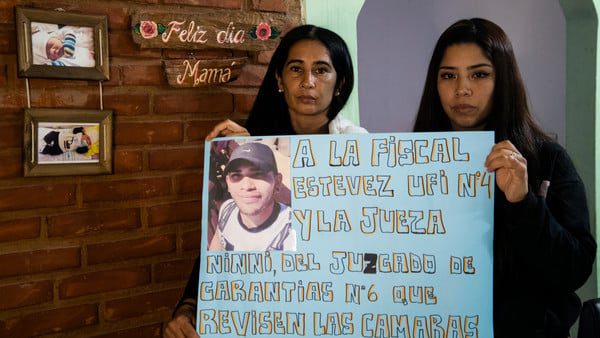Global Courant 2023-04-16 14:01:08
“Son, the police are at home. They are looking for you.” Javier Maximiliano Acosta (22) heard that phrase while working at a logistics company. At first he was happy. He believed that the visit was due to the robbery that he had suffered eleven days before. “Maybe they have news about my bike,” he thought. “They say they are for a Honda Tornado,” his mother clarified. “Maxi”, as they call him, told him that it couldn’t be. A Honda Wave had been stolen.
A while later, on the morning of that March 22, he arrived at his house in Tristán Suárez, Ezeiza. The Police informed him of the reason for the raid: he was involved in a robbery with a firearm. “No. They robbed me. The victim is me. I filed the complaint,” he managed to say, without understanding the situation. Until they gave him more details: a couple reported that during the robbery they suffered one of the assailants dropped a wallet. It was hers.
So that it is understood: Acosta suffered the theft of his motorcycle, and his wallet, on March 11, between 5:30 and 5:45 in the morning, on his way to work. It was in Luis Guillon. Minutes later, a couple in Burzaco suffered the theft of their motorcycle (the Honda Tornado that they were looking for in Javier’s house). According to Javier’s family, they would be the same thieves, in a criminal raid. Twenty-five days after the search (with negative results), Javier continues to be detained at the Almirante Brown City Hall. He is prosecuted for aggravated robbery for being committed in a town and in a gang and with a firearm. The fact is being investigated by the UFIYJ 4 of Lomas de Zamora, headed by Leonardo Kaszewski.
Ismael, the father of Javier Acosta. The family launched an investigation on their own to find the thieves. Photo: Federico Imas
“We presented witnesses, we requested images from security cameras, we toured the places of the two robberies to see if there are cameras. We no longer know what else to do to verify that ‘Maxi’ is innocent,” say Marcelo and Marianela, Acosta’s father and sister. . “Even the police realize that he is not a criminal. We go to visit him and they tell us ‘Ah, they are the family of the kid who is eating a garrón.’ The problem is that the victims are convinced that Javier was one of the four thieves”.
Javier was assaulted and beaten by six thieves who moved on three motorcycles. He received help from a neighbor who was encouraged to intervene to stop hitting him. The neighbor’s wife, who was also a witness, stated that she saw that four of the thieves headed to one side, on two motorcycles, and that the other two left on two motorcycles (one was Javier’s) in the opposite direction.
From there, Javier walked to Camino de Cintura: he waited for a bus, explained the situation to the driver, and traveled without paying the ticket to his house. He told his mother about the robbery and looked for the motorcycle’s papers to file the complaint. He went to the Tristán Suárez police station, where they told him that he had to report it to a Lavallol police station. Since there was no electricity, a police officer suggested that she file a complaint by e-mail. Javier asked for help. And according to his family, the one who wrote that email was the police who attended him, and who was summoned to testify.
“In the complaint, the woman only declared the theft of the motorcycle,” says Marianela. “She told him ‘When the light comes back we will complete it. But at least with this you can go and make the complaint to the motorcycle insurance'”.
That e-mail was received by the UFI 2 of Lomas de Zamora, which is investigating the robbery in which Javier is the victim. His next step was to report it to the insurance company (where he also reported the theft of his wallet, helmet, and cell phone). Days later, when he appeared to manage his new registration and they asked him for the complaint, they told him that in that document it should be clarified that his wallet and phone had also been stolen. He went back to the police station and sent the new e-mail with the new complaint.
Javier’s father and sisters, with the signs asking for his release. Photo: Federico Imas
Clarín agreed to the statements of the victims of the robbery for which Javier is arrested. They narrated having been locked up by four thieves who moved on two motorcycles. “Give me the motorcycle,” they yelled at them, showing them a weapon. None had a helmet. The person who got into the victims’ Honda Tornado is the one who lost the wallet in the getaway.
“I got the feeling that I didn’t have it in my pocket; You can see that she had it between her pants and boxer,” explained one of the owners of the Tornado.
In the wallet they found Javier’s ID. And they recognized him as the author of the robbery, the same person who had left with the motorcycle.
“We recognized him by his face and by a tattoo on his neck,” they added. In addition, they claimed to have searched for and recognized him on social networks.
“My brother doesn’t have a single criminal record,” Marianela clarifies, indignant. was Javier wearing?”
Marianela invites the Clarín team to her brother’s room. She shows the clothes she was wearing that day: an embroidered jacket, reflex pants and work boots. She says it’s impossible not to remember that kind of outfit.
Javier’s father shows a photo of the young man as a boy. The family says that he has been working since he was 15 years old. Photo: Federico Imas
Together with the rest of the family they began their own investigation. Since Javier spent his first days of detention in two police stations, and did not have access to telephones, he detailed the route he had taken since he left his house. His father and his sisters toured it. They did the same thing on the block where the Tornado was stolen. They took note of the security cameras that should have recorded it and gave the information to the private lawyer they found, so that he can present it to the prosecutor’s office. They also went to a monitoring center and searched for witnesses. Some of them are the bus driver who took Javier to his house and the two neighbors who helped him during the robbery.
“A neighbor showed us the images from a camera: Javier walks with difficulties; he is lame, minutes after suffering the robbery, on the way to the police station,” they denounce. But they clarify that the prosecution should request the rest of the images. Since they delivered the list of cameras 19 days ago and have no news, they decided to make the case public. They say they are doing it out of fear: “We think we may be exposing ourselves. We don’t know who is involved in this matter. But we don’t care because Javier is still in prison.”
A week after his arrest, Javier lost his job in logistics. He had bought the motorcycle from him in December and continued to pay the installments. “He was a bricklayer’s assistant, a painter, he made wells for pools, house demolitions. He has been working since he was 15 years old. He always earned little, but he never asked anyone for anything. He was so happy with his motorcycle and his last job,” Marianela closes, with teary eyes.
AS




